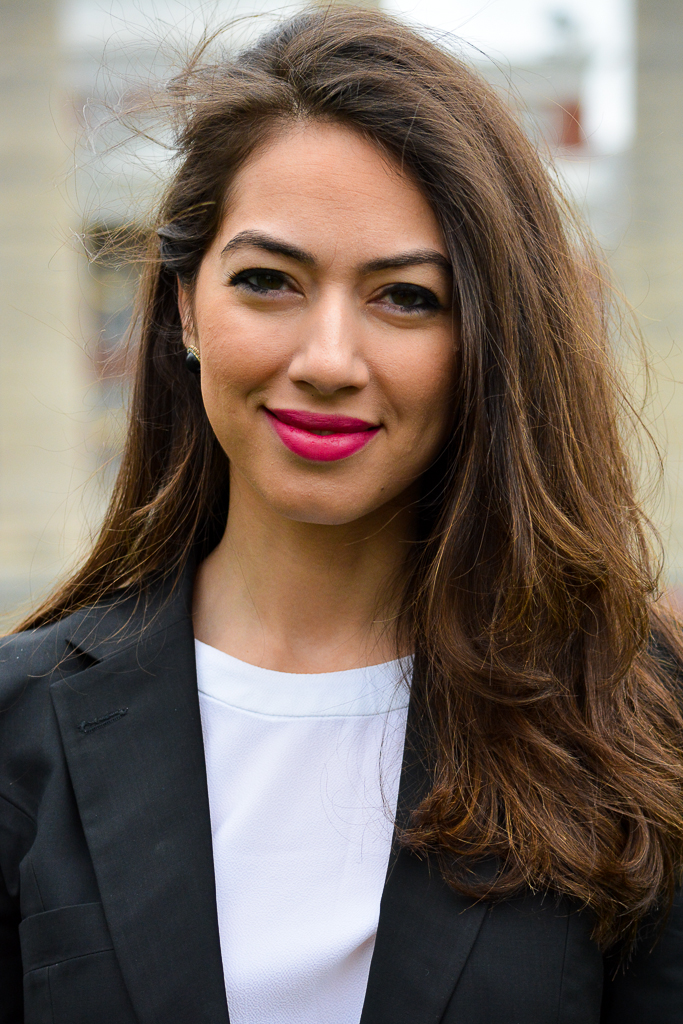AMAL KHAN
Lahore, Pakistan | Editor, Features Desk, The Nation
Daniel Pearl Fellow | Host: Los Angeles Business Journal
—By Mario José Pentón Martínez
In the winter of 2012, the managing director of The Nation was looking for a new voice to enliven the daily newspaper’s opinion and editorial pages, and she decided to take a chance. Rameeza Nizami gave the job of op-ed editor in her predominantly male newsroom to a young woman with knack for writing but with no experience in journalism.
How did it turn out? “Not for one day have I regretted giving her such a heavy charge,” Nizami wrote in her fellowship recommendation letter. Khan changed the tone of the editorials from “frumpy and unyielding” to “irreverent and persuasive.” Editor Salim Bokhari wrote that under Khan’s editorial leadership, “The Nation developed a reputation for fierce honesty by taking tough stances despite immense pressure to write otherwise.”
Amal Khan (ah MALL kHAHN) certainly didn’t seemed destined for such an outspoken occupation. She was taught in strict Catholic schools to fit in with conservative cultural expectations of females in the Middle East: be timid, collected, homebound; focus on pleasing a husband and educating their children in the same way.
“It was always a good student, good daughter,” Khan said. “I never broke the rules; it was a very sensitive girl, crying easily.”
In retrospect, one turning point was the 2002 murder of Wall Street Journal reporter Daniel Pearl in Pakistan by al-Qaida terrorists while on assignment to interview a radical Pakistani cleric. “I was only 16 years old, yet I remember well, my obsession with this story,” Khan wrote in an essay. “I spent days on our family’s PC, learning more about him and his strange, beautiful writings. How did a man who wrote about lost violins end up killed and mutilated by terrorists in my country? At the time, it was difficult to understand.”
Amal speaks with Global Journalist at the University of Missouri School of Journalism to talk about the life of female journalists in Pakistan.
Another pivot was her father’s decision to send her to a women’s university in Northampton, Massachusetts, Smith College. “It was a complete culture shock for me,” Amal said. But the experience allowed her to ask questions she had never been able to ask before, including those about the roles of a woman. She did not immediately notice, but her mindset and values were changing. Amal aimed for a career in politics.
But after getting her master’s degree at a university in London and returning to Lahore, Amal decided to channel her love of writing into a career. “I wanted to meet people, tell stories, to be a journalist … I enjoy journalism for giving me the possibility to interfere in the lives of people and tell their stories.”
At The Nation, Khan recalled, “As the issues became tougher, so did the editorials. Around us, journalists, lawyers and activists were attacked, and sometimes killed for their opinions. Despite the dangers, my editor-in-chief believed in my mission as much as I did.”
In the summer of 2015, Khan became features editor, and she quickly focused on the country’s most profound problems. Her first story shed light on the case of Shafqat Hussain, who, according to a document obtained by The Nation, was a juvenile when he was tortured into confessing to a murder and spent 11 years on death row. Hussain’s defenders managed to persuade judges to stop his scheduled execution four times before he was hanged in August 2015.
“Human frailty in Pakistan is everywhere,” she said, but journalists in her country tend to dehumanize the news. Amal said she strives to accurately portray her diverse country and follow the spirit of Daniel Pearl, who was an excellent journalist because he was a “fantastic storyteller.” “I have begun the difficult task of truth-telling for which he lived and for which he gave his life.”
Editor Bokhari believes there are two kinds of journalists: “Those who write for themselves and those who write for the bigger purpose. Amal never loses sight of that sense of purpose.”
For more on the fellows’ interaction with journalism students at the University of Missouri click here.




